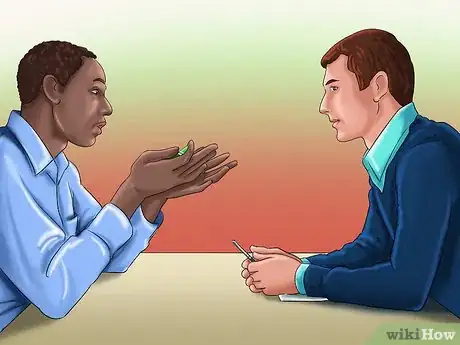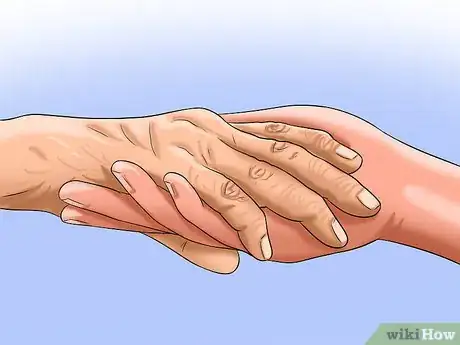This article was co-authored by Lauren Krasny. Lauren Krasny is a Leadership and Executive Coach and the Founder of Reignite Coaching, her professional and personal coaching service based in the San Francisco Bay Area. She also currently coaches for the LEAD Program at Stanford University Graduate School of Business and is a former Digital Health Coach for Omada Health and Modern Health. Lauren received her coaching training from the Coach Training Institute (CTI). She holds a BA in Psychology from the University of Michigan.
There are 16 references cited in this article, which can be found at the bottom of the page.
This article has been viewed 108,744 times.
Figuring out what makes you happy can be a long process, as you will find the same things that make you happy don't necessarily make everyone else happy. One way to learn what makes you happy is to gather data throughout your days about how happy you are, so you can notice patterns of happiness. You can also learn about your values and pursue new hobbies, as well as focus on some factors that make many people happy.
Things You Should Know
- Tracking your happiness by journaling or using an app can help you narrow down what you find value and joy in.
- Core values are essential when it comes to finding yourself, so explore what matters most to you.
- Finding a fulfilling hobby and pursuing your passions can dramatically improve your overall emotional wellbeing.
- Don’t neglect your social life; friends and family are a key part of staying happy and healthy.
Steps
Gathering Information About Your Happiness
-
1Rate your days. One key to learning what makes you happy is to start looking for patterns. The best way to look for patterns is to create data. That is, you need to take time each night to write about your day and how you feel about it. That way, you can start seeing the things that make you happy.[1]
- Start by rating your day on a scale from 1 to 10. Ten is the best, and one is the worst. Don't think too hard. Just think about how happy you were that day.
- Write down what you did that day. If you can, try to figure out what made the day good or bad, happiness-wise.
- Try to write down things that go on, even if you're not sure how they affect your happiness yet, such as "Worked on my novel," or "Went to the movies."
-
2Use a happiness tracking app. Another way to track how happy you are at certain times is to use an app built for that purpose. These apps will ask you questions throughout the day, generally questioning you about your happiness at a certain point in time. They can help you build up data about how happy you are doing certain things, which in turn can help you figure out what's making you happiest.[2]Advertisement
-
3Look at the data. Once you've created the data, you need to take some time to examine it. Look at the days when you're the most happy. What are you doing on those days? On the days when you're the most upset, what are you doing? See what patterns you notice on the happy and sad days to help you figure out what makes you happy.[3]
-
4Take a happiness quiz. Another option to gauge your happiness is to try a happiness quiz. These quizzes will provide more general answers than, say, using reflection to figure out what makes you happy, but they may be able to point you in the right direction.[4]
- You can find any number of these quizzes online to take.
- Try taking more than one to get a broader answer.
-
5Meditate for happiness. Meditation forces you to spend time with you and only you. That means you are left alone with your thoughts and feelings. As you confront those thoughts and feelings, you may start learning things about yourself, such as what is upsetting to you and what makes you the happiest.[5]
- In addition to helping you find what makes you happy, meditation can lead you to greater happiness just by doing it because it releases chemicals in your body that make you happier, such as endorphins and serotonin.[6]
- One option for meditation is just to sit quietly with your eyes closed and practice deep breathing. You can count to four in your head as you breathe in through your nose and hold for four counts. Count to four again as you slowly breathe out. Keeping practice this breathing for several minutes, trying to focus solely on your breath moving in and out.
- If you don't want to fly solo on meditation, consider using guided meditation. You can find a number of guided meditations online, or you can download a meditation app for your phone.
-
6Find a therapist. Another option for helping you evaluate what makes you happy is to get someone to help you. Therapists are trained to help you find what makes you happy in your life, and they can help you work through any issues that are making you unhappy.[7]
- A therapist can help you cut through the cloudiness and see you for who you really are, even when you can't do that by yourself.
- If you're not sure how to start looking for a therapist, ask your friends for recommendations, especially ones that you know have used a therapist before.
- If you can't afford a therapist, go to a sliding scale clinic, where you will pay based on what you make.
Figuring Out Your Core Values
-
1Make a list. Start by doing a little journaling. Take out a piece of paper, and write "What is most important to me?" at the top. Now, start listing things that are important. Try not to think too hard about it. Rather, list the things that pop into your head in the order they pop into your head.
- Identifying your values can help you figure out what will make you the most happy. For instance, if you realize you value your family over your job, you may decide to spend more time at home.
- For example, maybe you would write "my family," "my pets," and "my job."
- Also write down things that aren't important to you and things that don't make you happy so you can work to eliminate them from your life.[8]
-
2Translate those into values. See if you can figure out how to translate what's most important to you into values. If you're not sure where to start, you can use a list of values off the internet, such as the one on this site: https://www.mindtools.com/pages/article/newTED_85.htm, so you can see how they connect to what you've listed.[9]
- For example, if you listed "my family," then "family happiness" is probably one of your values.
- If you listed "travel," then maybe adventure is one of your values.
-
3Look at other values on the list. If you used a list of values from the internet, it can help to simply look through that list to see if you can find other things you value. Go through a list and star any values that seem relevant to your life. Right now, star as many as you feel are important to you, even if it seems like you're starring too many at once.[10]
-
4Narrow down your values. Now try narrowing down your values to the 10 most important. You're not saying that you don't value the ones you're leaving off. Rather, you're looking inside yourself to see what is most important to you. Once you've narrowed down to 10, try narrowing down to 5. Next, try to pick your most important value.[11]
- You can also try ranking the values you've starred to see which ones feel the most important to you.
- If you're having a hard time deciding, ask yourself which ones you could live without. For instance, you might find that you can live without adventure as long as your family is happy.
-
5Take an assessment. Another option to help you figure out your values is to take an assessment. You can find any number of assessments on the internet for free that will help you assess what you value. Some may require you to give them an email address, though. Try looking on psychology-based sites.[12]
- An assessment will ask you a series of questions, sometimes scenario-based, to help determine what your values are. However, remember that no assessment is perfect, and if you feel like the values you get back are off, feel free to move them around as needed.
-
6Rearrange your life. Once you figure out what your values are, it's time to put those into play. Consider how you can rearrange your life to better fit your values. Rearranging your life should make you happier, as it is bringing your life more in line with who you are.[13]
- For instance, if you find you value your family more, you may want to consider spending more time at home by cutting back on your hours.
- Another example is that if you find you value adventure, spend more time seeking it in your life. You don't need to go on glamorous vacations to find adventure. You can do it in your own city by seeking out new places to visit, new things to try, and new restaurants to eat.
- The point is whatever values you have at the top, especially the top value, should come first in your life. You need to make space for it with your time, energy, and money.
Exploring Hobbies and Skills
-
1Pursue active hobbies. Active hobbies, such as engaging with other people, exercising, or making things, can increase your happiness in comparison to passive hobbies, such as watching television. Therefore, exploring hobbies that get you active can help increase your happiness once you find one you love.[14]
- You don't have to be good at the hobby for you to enjoy it. You just need to find it meaningful and relaxing.[15]
-
2Look at what you loved in the past. If you're looking for a new hobby, consider what you enjoyed doing in the past, even in childhood. For instance, if you loved coloring, you could find a pastime that puts similar skills into play, such as drawing with colored pencils.[16]
-
3Browse hobbies. Another way to try picking up a new hobby is to browse places that are focused on hobbies. For instance, you could visit the craft store or sporting goods store. You could also go to the library and browse through the books on different kinds of hobbies. When you find something that interests you, try to find more information on that hobby.[17]
-
4Join a class or club. Once you figure out something you want to try, find a place in your local community to engage. Many communities have hobby clubs through the library or parks and recreation department. You can also take a class, either through a community college, a local museum, or your parks and recreation department. Not only will you explore your hobby, you'll meet other like-minded people who have similar interests.
-
5Work on it a bit every day. If you've decided you like a particular hobby, spend some time doing it regularly. Try a half an hour every day or a couple hours one or two nights a week. Make sure you are making time to do the hobbies you enjoy, so that it can increase your overall happiness.[18]
- If you find you aren't enjoying a hobby anymore, it's fine to abandon it and explore other hobbies you may enjoy more.
Pursuing Common Happiness Factors
-
1Volunteer in your community. Volunteering leads to happiness for many people, partially because it puts the focus outside of yourself. Studies have shown that helping others out often leads to an increase in well-being and happiness, even if you are regularly feeling stressed out or burned out.[19]
- Find a place to volunteer in your community. Pick something you're passionate about or that fits your skill set.
- For instance, maybe you are passionate about helping the homeless, so you decide to volunteer at a soup kitchen.
- Alternatively, maybe you are a skilled marketer, so you decide to help out a local nonprofit with its marketing.
-
2Focus on optimism, particularly realistic optimism. Optimistic people tend to be happier than pessimistic people. Being an optimist means looking at life differently. You may need to relearn how you think about problems, approaching them with a new frame of mind.[20]
- For instance, instead of looking as setbacks as failures, try looking at them as either flukes or something that you can learn from. In other words, if you have a setback, you may need to take a different approach, not quit altogether.
- However, optimists do need a sense of realism, too. That is, while you hope for the best, it's fine to take some precautions to ward off certain outcomes.
-
3Increase your sense of control. When you feel like you have control over your life, you tend to be happier. Therefore, increasing your sense of control can lead to greater happiness, especially if you feel like you don't have much control over your life at the moment.[21]
- One way to increase your sense of control is to set deadlines for yourself, even for personal tasks.
- When you complete a task, you feel more in control because you've laid out something for you to do, and you've done it.
-
4Go out with friends. Most people benefit from socializing with other people on a regular basis. You may find socializing difficult if you're an introvert. However, you don't need to go out with scores of people to socialize. You can socialize with just a couple of friends at a time, for instance, or even just hang out with your family.[22]
- If you need more friends in your life, pursuing hobbies through joining a club can help. That way, you meet people with similar interests, and you have something to talk about.
References
- ↑ https://hbr.org/2013/07/want-to-know-what-makes-you-ha/
- ↑ https://hbr.org/2013/07/want-to-know-what-makes-you-ha/
- ↑ https://hbr.org/2013/07/want-to-know-what-makes-you-ha/
- ↑ https://www.psychologies.co.uk/test-what-makes-you-happy
- ↑ http://tinybuddha.com/blog/5-ways-meditation-can-improve-your-life-and-make-you-happier/
- ↑ http://notesonbliss.com/benefits-of-meditation/
- ↑ http://gresik.ca/2016/01/how-is-therapy-going-to-make-me-happy-a-post-for-bell-lets-talk-day/
- ↑ Lauren Krasny. Executive, Strategic, & Personal Coach. Expert Interview. 27 March 2020.
- ↑ http://sourcesofinsight.com/finding-your-values/
- ↑ http://sourcesofinsight.com/finding-your-values/
- ↑ http://sourcesofinsight.com/finding-your-values/
- ↑ http://www.valuescentre.com/our-products/products-individuals/personal-values-assessment-pva
- ↑ https://www.mindtools.com/pages/article/newTED_85.htm
- ↑ http://www.portlandpsychotherapyclinic.com/counseling/blog/money-can-buy-happiness-hobbies-are-even-better
- ↑ http://www.wsj.com/articles/does-having-a-hobby-increase-your-happiness-1440430582
- ↑ http://www.lifehack.org/articles/lifestyle/hobbies-are-good-for-you-how-find-one-that-fits-your-personality.html
- ↑ http://www.lifehack.org/articles/lifestyle/hobbies-are-good-for-you-how-find-one-that-fits-your-personality.html
- ↑ http://www.lifehack.org/articles/lifestyle/hobbies-are-good-for-you-how-find-one-that-fits-your-personality.html
- ↑ https://www.holstee.com/blogs/mindful-matter/16007024-5-scientifically-proven-ways-to-boost-happiness
- ↑ https://www.psychologytoday.com/articles/200910/the-secrets-happiness
- ↑ https://www.psychologytoday.com/articles/200910/the-secrets-happiness
- ↑ https://www.psychologytoday.com/articles/200910/the-secrets-happiness
About This Article
Finding out what makes you happy is key to living a fulfilling life and all it takes is a little exploration. Try using a happiness tracking app to collect data on what makes you happiest so you can focus more time on those things. Or, take an online quiz to find out what’s most important to you, like your family, job, and socializing with friends. Try new things, like meditation, sports, and creative activities, to find your passions. Revisit hobbies and interests you liked as a child to reconnect with other sources of happiness. You can also volunteer to see if helping other people makes you happy. Then, try to work this into your lifestyle more. For more tips from our co-author, including how to write a list of your core values, read on!


















































































